Welcome! Whether your family has been part of our community for years or you’re just joining us for the first time, we look forward to spending 2022 together. After the last two years, everyone is looking forward to a fresh start, with a return to some semblance of normalcy.
Some children will be Montessori students for the very first time. Others are moving up to a new level. Either way, it’s helpful to know what’s coming, and to have a little information regarding what to expect. Scan through the headings below to find which section or sections apply to your child.
If you’re brand-new to Montessori
During the application process and through your own personal research, you’ve probably learned a bit about what makes Montessori schools different from more conventional settings. The journey you find yourself beginning will be awe-inspiring, as many seasoned Montessori parents will tell you.
Montessori education has been around for more than a century, and so much of what we do is grounded in what works and what has worked for generations. Still, as a rule, educators are curious people who never stop learning. We are always seeking out new ways to make the experience more enriching for the children in our care. We observe, we ask questions, and we try out different methods that have worked well for others.
We encourage you to try the same. There is so much to learn about this amazing educational approach, that it can’t possibly be done all at once. This blog is a great place to check in and read helpful information. Your child’s educators, as well as other Montessori parents are excellent resources to turn to. As a school, we work to facilitate community building events as well as parent education offerings that will help answer your questions – although this type of learning usually leads to even more curiosity!
Thank you for joining us. We are so glad to have you with us.
Under 3 (Birth-3 Years)
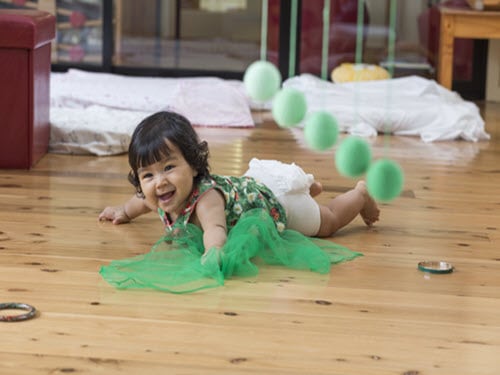
The NIDO and Parent Toddler program is all about you spending time together with your child in a beautifully prepared environment without everyday interruptions and pressures. You have time to observe your child in the environment and to observe the educator working with your child. Staff will readily answer your parenting questions. When the weather is good, children can freely move outdoors. As you child gets older, more and more practical life activities (care of the environment and care of self) will be available for your child to explore.
Toddler Community (2-3 Years)

Now your child attends without you and the educators prepare to further develop their independence. The Prepared Environment offer stability and emotional security. The children join together in community, spending time as a regular group which creates a sense of belonging. There are five areas of the Environment to explore- practical life, language, fine-motor activities (which can be manipulatives), self-expression and gross motor.
The Toddlers also join in events with the rest of the school like our aboriginal Smoking Ceremony and they regularly venture out to explore the wider school environment this can include taking their baskets to collect produce from the garden or visiting the classrooms to see the animals and the chickens.
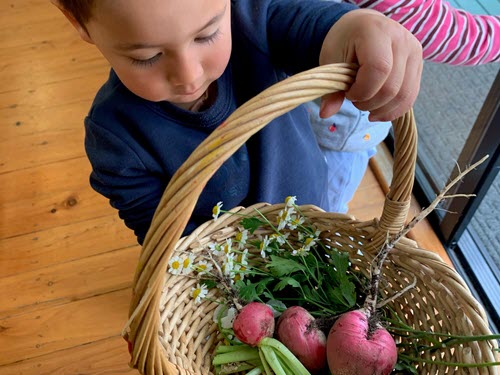
New to Pre-Primary (3-6 Years)
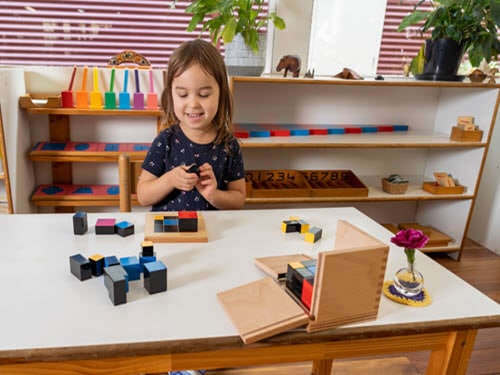
Montessori pre-school environments are magical places. This is, after all, where it all began with the opening of Casa dei Bambini in Rome in 1907. Just how is this setting any different than other preschools or kindergarten classes?
Right away you will notice the emphasis on personal independence. We encourage even our youngest pre-school students to walk to their classroom by themselves (once they settle into the routine), remove and hang their bag by themselves, and store their lunchboxes. You’ll notice the work continues in subtle ways as their educator meets them at the door, makes eye contact, greets them warmly and intentionally, and guides them to do the same.
In the classroom, your child will be free to explore and learn on their own terms. Many folks are surprised this does not translate into children running wildly around the room. The reason is that the freedom we offer is bound within carefully constructed limits. Yes, a child may choose their preferred work from the shelves, but we only put out work that we want them to be doing. Yes, they may stop to have a snack whenever their body tells them it’s time, but they are taught to clean their own crumbs and wash their own crockery.
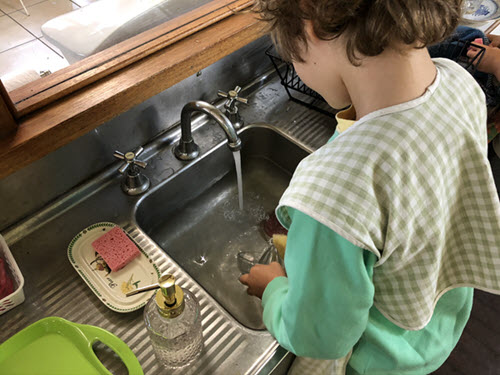
Some new-to-Montessori families wonder what we do if a child wants to focus on the same work or area of the classroom over and over again. Short answer: we let them. Our belief, which has been confirmed countless times with experience, is that if a child is repeatedly drawn to something it’s because they have something important to learn from it. Once they have exhausted that need, they will eventually move on. We have learned to remove our own expectations of how long it should take or what trajectory an individual’s learning should follow.
One important Montessori mantra to keep in mind: follow the child. We let this guide so much of what we do, and it leads to amazing results.
New to Lower Primary (6-9 Years)
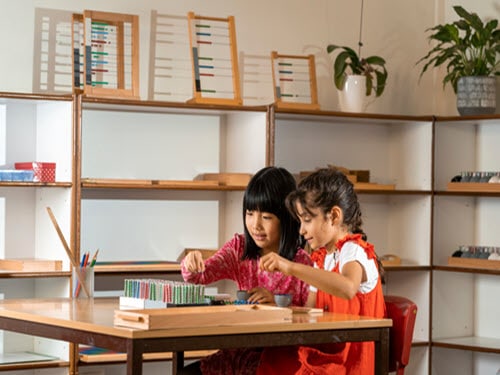
There is a definite shift in children around age six, which is why Dr. Montessori determined this to be the beginning of the second plane of development. You will notice your child is suddenly more imaginative, social with their peers, physically a bit clumsy, and so very eager to learn everything they can about the world (and universe) around them.
So, we keep all these things in mind in the Lower Primary environment. Some highlights:
- Lessons are more often given in small groups (as opposed to individually when children are younger).
- Learning and work is based on teaching important basic mathematics and literacy skills as well as a globally focused foundation in science, geography, and history.
- The classroom is arranged so that children may work together with their peers.
- New expectations are established to ensure that children are engaging with academic content in all areas. Our Educators meet and converse with students to share tools, strategies, and give suggestions to help them achieve goals.
- We give children BIG work, which is what they crave. Projects stretch out over days and weeks, and materials stretch across the classroom floor.
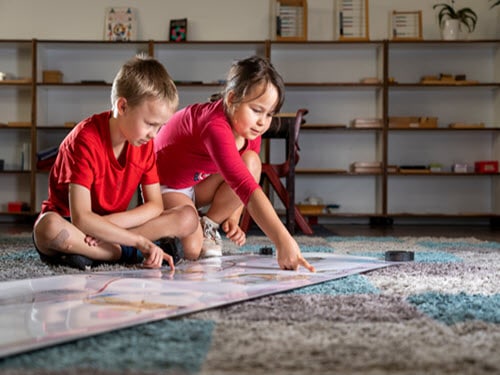
New to Upper Primary (9-12 Years)
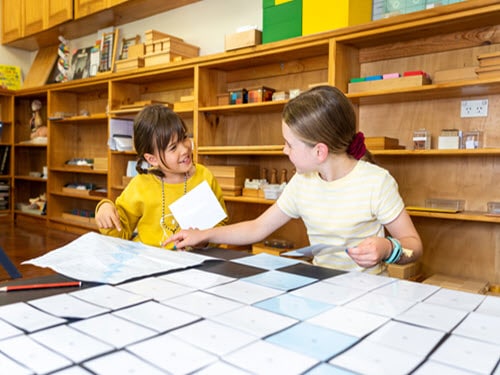
The Upper Primary (9-12 Years) is designed to keep your child’s spark for learning alive by providing areas for individual and group projects, a classroom library and materials suited to guide and support autonomy. They are also provided with structure to help with personal organsiation.
Studies include mathematics, science, geometry, language, history and biology. They also have more time with their specialist teachers in sport, music, Japanese and art. Practical life continues with lots more cooking.
Sometime during the Upper Primary years, your child may begin to stop using the gorgeous wooden Montessori materials. This is because after years of work, they have made their way to abstract learning. They no longer need concrete items to manipulate with their hands in order to understand concepts. This isn’t to say they never do anything hands-on; it just starts to look a bit different.
Upper Primary children have also had a few years to navigate social structures with their peers. They have had practice forming friendships and working through conflict. They have a better sense of who they are and how to interact with others. This brings a new sense of calm that was not seen when they were younger. But never fear, children are children and so we continue to support their social development by using conflict resolution and restorative justice. We repair, we don’t punish. strategies. After all, Montessori is an education for peace.
Social justice becomes more important to children at this age, and so our curriculum supports growth and learning that allows them to become active and engaged members of their communities. This year our upper Primary students will have the opportunity to participate in the Montessori Model United Nations (MMUN). Click this link for more information.
With COVID risk hopefully behind us, we will also be getting back into our normal practice of venturing out into the community. In Montessori we call this ‘Going Out’ and the children must do their own planning for their specific projects. It’s all about connectedness to all humanity and encouraging your child’s natural desire to make positive contributions to the world they live in.
Leadership opportunities are also another important part of our program at this level. Our Upper Primary students can join the buddy reading program where they read with our Pre-School children. They also assist Tamlin with the 5-year-old sport program. They also run our service-learning program so you will see 9-12 Years students planning and running different fundraising events for students for example, Jump rope for Heart.
Questions? Comments? We’d love to hear from you. Please feel free to reach out with your thoughts.



